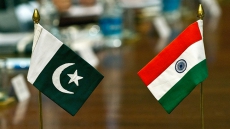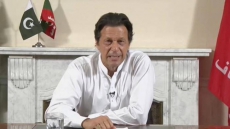It is telling that no country, including China, has spoken out in favour of Pakistan after India's air strike on a terror camp in the country, a former Pakistani envoy to the US said Tuesday, asserting that it was reflective that the world's patience on terrorist safe havens is running thin.
India bombed and destroyed Jaish-e-Mohammed's (JeM) biggest training camp in Balakot in Pakistan's restive Khyber Pakhtunkhwa province, about 80-km from the Line of Control (LoC) early Tuesday, killing a "very large number" of terrorists, trainers and senior commanders."
The strike was the first by the Indian Air Force (IAF) inside Pakistan after the 1971 war.
"It is telling that no country has spoken out in Pakistan's favour after the Indian air strike," Husain Haqqani, the former Pakistani Ambassador to the US, told.
"Even China called for restraint on both sides instead of supporting Pakistan in protesting India's violation of Pakistan's air space," Mr Haqqani said in response to a question.
Mr Haqqani has been at odds with the powerful Pakistan Army and very frequently receives threats from radical groups in Pakistan.
Currently serving as the Director of South and Central Asia at the Hudson Institute think-tank, his latest book is "Reimagining Pakistan: Transforming a Dysfunctional Nuclear State".
"Hyper-nationalist sentiment in Pakistan may not want to recognise it but the world's patience on terrorist safe havens is running thin and that is not good for Pakistan," Mr Haqqani said.
Another Pakistani scholar Moeed Yusuf, often considered to be close to the establishment, agreed that the global opinion was not with Pakistan.
"Given that global opinion is with India, whether a skirmish occurs in Pakistani or Indian airspace doesn't matter as much. So Pakistan will do its best to absorb this strike and not escalate," Moeed Yusuf told.
"Of course, the paradox is that the more successful an Indian strike, the more difficult it is for Pakistan to look the other way," he said.
Currently, associate vice president of the Asia Center at the US Institute of Peace, a scholar with the US Institute of peace, his latest book "Brokering Peace in Nuclear Environments" talks about relationship between the two South Asian nuclear neighbours in the event of terrorist activities from across the border.
"Bottom line: we are headed for a serious crisis if Pakistan feels compelled to respond or if India tries a repeat. And this will be a disaster because India and Pakistan know how to enter a crisis, they have never de-escalated without relying on third parties like the US," he said.
Yusuf sought the US lead in reducing the tension.
"If I were Washington, I'd be in overdrive making phone calls and signalling that it wants tensions to be de-escalated now. The risks of letting this play out are too great," he said.
The air strike came 12 days after the JeM carried out a suicide attack in Jammu and Kashmir's Pulwama district that killed 40 CRPF soldiers.
India launched a major diplomatic offensive against Islamabad after the Pulwama attack and highlighted Pakistan's role in using terrorism as an instrument of state policy.
The international community led by the US pressed Pakistan to deny safe haven to terror groups operating form its soil and bring the perpetrators of the Pulwama attack to justice.
India has asked Pakistan to take immediate and verifiable action against terrorists and terror groups operating from territories under its control.
New Delhi also announced the withdrawal of the Most Favoured Nation status for Pakistan and hiked the customs duty by 200 per cent on goods originating from Pakistan.

